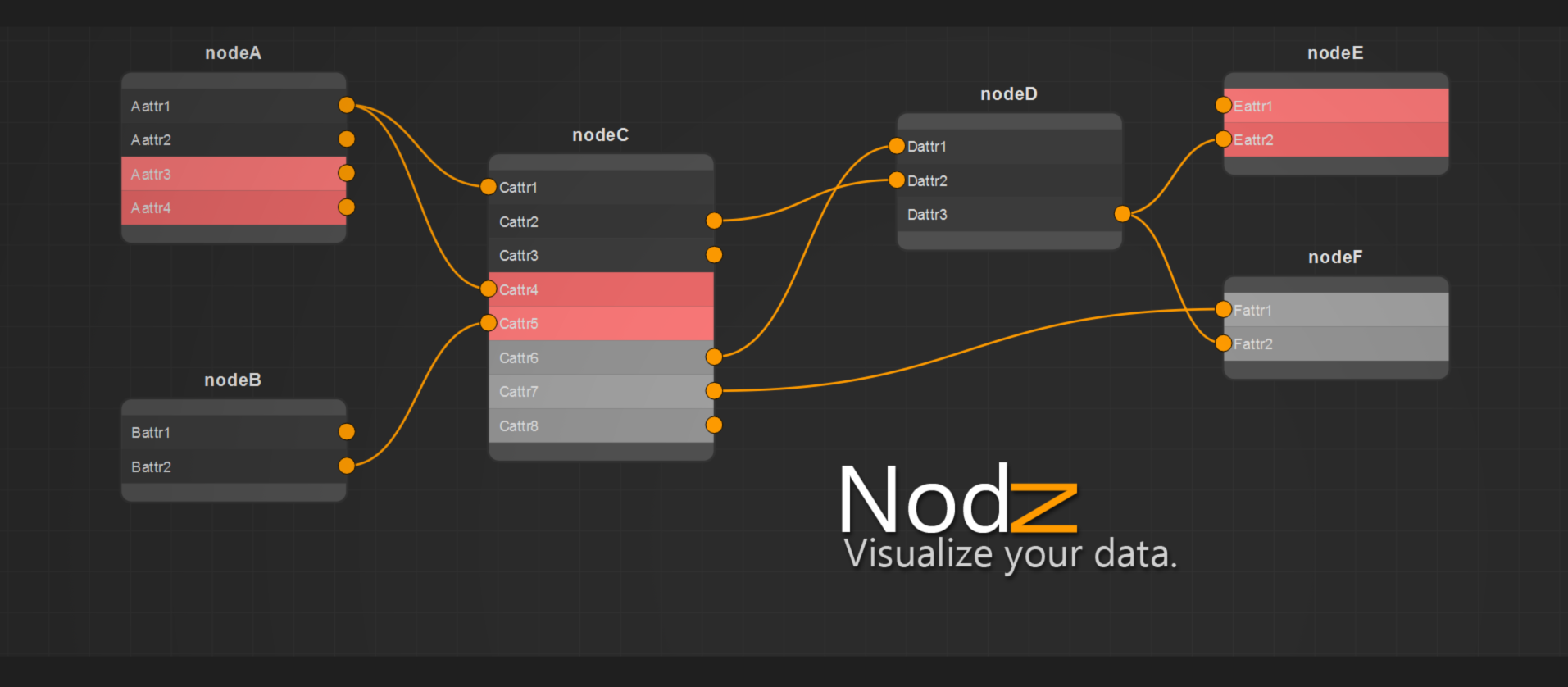Nodz is a very user friendly python library to create nodes based graphs. It can be connected to anything you want as long as it understands python. Nodz does not hold any data other than its own graphics and attributes types as it is used by the graphics. Nods provides you with a very simple way to read your graph, it outputs connections as strings ('Node1.attribute1', 'node2.attribute5')
Nodz is partially customizable via a configuration file that let you change colors and the shape of nodes.
If you find any errors/bugs/flaws or anything bad, feel free to let me know so I can fix it for the next persons that would like to download nodz.
PLEASE MAKE SURE TO CREATE 1 PULL REQUEST PER ISSUE ! THIS IS EASIER AND CLEANER TO PROCESS
Nodz in under the MIT license.
Prerequisite
- Python
- pyQt4 or pyQt5 or pySide or pySide2
- Qt.py
Nodz needs to be in a PYTHONPATH.
Qt.py is very important as Nodz is based on it in order to work for multiple versions of Qt.
Short and easy story for lazy peeps.
Configuration file
Nodz comes with a default configuration file, it is specified what can be removed and what can't be.
If this file stays in the default location, it is auto loaded BUT you still need to apply it to Nodz (look at nodz_demo.py lines 5/6)
Be careful when editing it, if you are missing a "," it will error. So don't screw up.
Features
Nodz comes by default with few features, you can toggle the grid visibility and the auto snap mode + some hotkeys. Hotkeys are at the moment based on Autodesk Maya because I developped this library for my personnal use in this specific software but I'm planning on adding that part in the configuration file so everyone can set different hotkeys.
nodz.gridVisToggle = True
nodz.gridSnapToggle = Falsedel : delete the selected nodes
f : zoom focus on selected items, all the items if nothing is selected
s : snap the selected node on the grid
API
Nodz has a very simple API of 12 methods. For more information on each method, please read nodz_main.py as it has all the documentation required.
Initialize
def loadConfig(filePath=defautConfigPath)
def initialize()Nodes
def createNode(name, preset, position, alternate)
def deleteNode(node)
def editNode(node, newName)Attributes
def createAttribute(node, name, index, preset, plug, socket, dataType)
def deleteAttribute(node, index)
def editAttribute( node, index, newName, newIndex)Connections
def createConnection(sourceNode, sourceAttr, targetNode, targetAttr)Graph
def saveGraph(filePath)
def loadGraph(filePath)
def evaluateGraph()
def clearGraph()Signals
Nodz also offers you some signals, most of them can feel redundant considering the design of the library but I'm sure some of you will find a use for it. It's better to have them just in case than not having them. They are absolutly not mandatory in order for nodz to work.
Nodes
signal_NodeCreated(nodeName)
signal_NodeDeleted([nodeNames])
signal_NodeEdited(oldName, newName)
signal_NodeSelected([nodeNames])
signal_NodeMoved(nodeName, nodePos)Attributes
signal_AttrCreated(nodeName, attrIndex)
signal_AttrDeleted(nodeName, attrIndex)
signal_AttrEdited(nodeName, oldIndex, newIndex)Connections
signal_PlugConnected(srcNodeName, plugAttribute, dstNodeName, socketAttribue)
signal_PlugDisconnected(srcNodeName, plugAttribute, dstNodeName, socketAttribue)
signal_SocketConnected(srcNodeName, plugAttribute, dstNodeName, socketAttribue)
signal_SocketDisconnected(srcNodeName, plugAttribute, dstNodeName, socketAttribue)Graph
signal_GraphSaved()
signal_GraphLoaded()
signal_GraphCleared()View
signal_KeyPressed(key)
signal_Dropped(drop position)